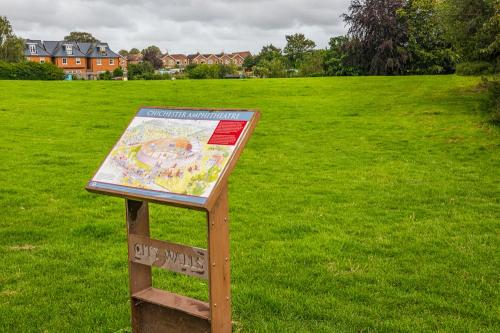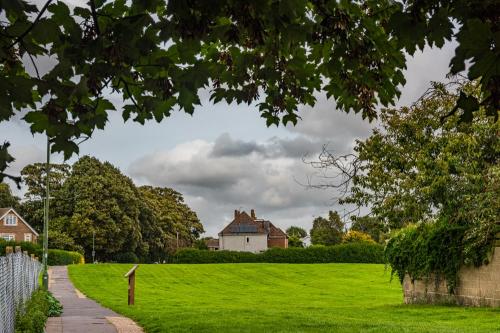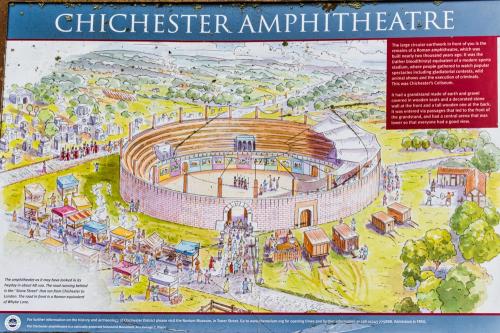
A public park outside the old Roman walls of historic Chichester hides a secret. The green grass of the park, accessed via the end of Whyke Lane, covers the site of a 1st-century Roman amphitheatre.
History
The amphitheatre was discovered in 1935 by a local resident, Raymond Carlyon-Britton, who became convinced that a city the size of Roman Chichester (known to the Romans as Noviomagus Reginorum) would have had a theatre for public spectacles such as gladiatorial combat and the execution of convicted criminals.
Mr Carlyon-Britton began to examine the area immediately outside the Roman walls in 1934. Near Eastgate, some 200 yards outside the walls and 250 yards from the Roman East Gate, he found the oval outline of the amphitheatre.
The amphitheatre stood near the start of Stane Street, the Roman road that led from Chichester to London. It was separated from the city by the River Lavant.
Excavations
The site was partially excavated by Ms GM White in 1935 but was then backfilled to create the basically level park that we see today.
Excavations revealed that the amphitheatre measured about 70m on a north-south axis and 60m east to west. It had a gravelled floor set roughly 1.2m below ground level. The floor was protected by a timber retaining wall which was protected with plaster and then painted. The gateways and entrance passage were faced with flint and mortar. The seating area was an earthen bank rising 1.8m high.
The amphitheatre was erected sometime between AD 70 and AD 90. It remained in use until about AD 200, after which it was left to decay. The site was stripped for useful building materials, which may have been used to strengthen the town defences.

What to See
The earthwork banks are still discernible, though they lie so close to the ground that it takes some imagination to picture the Roman site as it would have looked in the late 1st century.
Archaeological evidence, including Light Detection and Ranging (lidar) imaging from aerial photography, tells us that the amphitheatre was formed of a gravel bank with timber seating. The southeastern corner of the site is overlaid by modern housing on Whyke Lane, but 80 per cent of the amphitheatre is accessible in the park.
The visible remains are, frankly, underwhelming. There is, as of this writing, one information panel beside the paved path that leads off the end of Whyke Lane into the park. This panel shows an artist's impression of what the amphitheatre looked like around the year AD 100.
In 2020 a study of the site proposed improving signage and access to the park and inserting seats and/or steel pins to show the outline of the gravel seating bank. To date, none of these plans have been implemented.

Visiting
It is easy to reach the amphitheatre site, but not intuitive, as there are no signs that we could see until you are inside the park. There is a paved footpath from the end of Whyke Lane to the west and from Velyn Avenue to the east. The Whyke Lane entrance is only a few steps from the southern end of the Cattle Market Car Park. The amphitheatre site can be accessed at any time.
If you are arriving by car, simply park in the Cattle Market car park and make for the south-east corner of the site. You pass through a gap in the brick wall and you will see a paved footpath directly ahead of you that leads into Amphitheatre Park. The information panel is directly beside the path.
About Chichester Roman Amphitheatre
Address: Amphitheatre Park, Whyke Lane, Chichester,
West Sussex,
England, PO19 7UR
Attraction Type: Roman Site
Location: In a public park at the northern end of Whyke Lane. Easy access from the Cattle Market car park (pay and display).
Website: Chichester Roman Amphitheatre
Location
map
OS: SU866046
Photo Credit: David Ross and Britain Express
HERITAGE
 We've 'tagged' this attraction information to help you find related historic attractions and learn more about major time periods mentioned.
We've 'tagged' this attraction information to help you find related historic attractions and learn more about major time periods mentioned.
Historic Time Periods:
Find other attractions tagged with:
1st century (Time Period) - Roman (Time Period) -
NEARBY HISTORIC ATTRACTIONS
Heritage Rated from 1- 5 (low to exceptional) on historic interest
Chichester, St Pancras Church - 0.1 miles (Historic Church) ![]()
Litten War Memorial Gardens - 0.2 miles (Garden) ![]()
Chichester, St John the Evangelist - 0.2 miles (Historic Church) ![]()
Pallant House Gallery - 0.3 miles (Museum) ![]()
Chichester Roman City Walls - 0.3 miles (Roman Site) ![]()
St Mary's Hospital Almshouses - 0.3 miles (Historic Building) ![]()
Chichester, St Olave's Church - 0.4 miles (Historic Church) ![]()
Chichester Market Cross - 0.4 miles (Historic Building) ![]()
Nearest Holiday Cottages to Chichester Roman Amphitheatre:
Runcton, West Sussex
Sleeps: 4
Stay from: £523 - 1517
More self catering near Chichester Roman Amphitheatre



